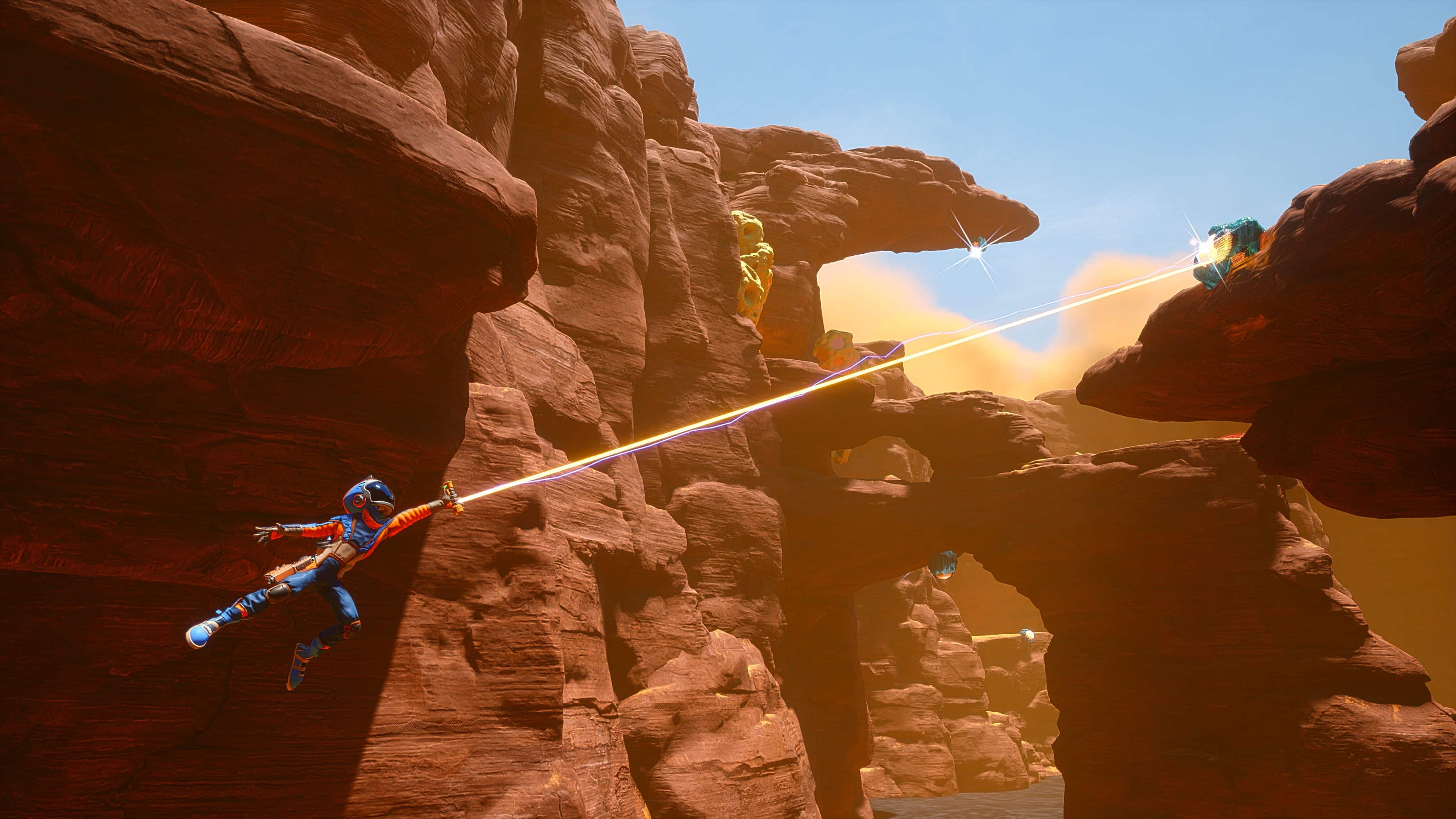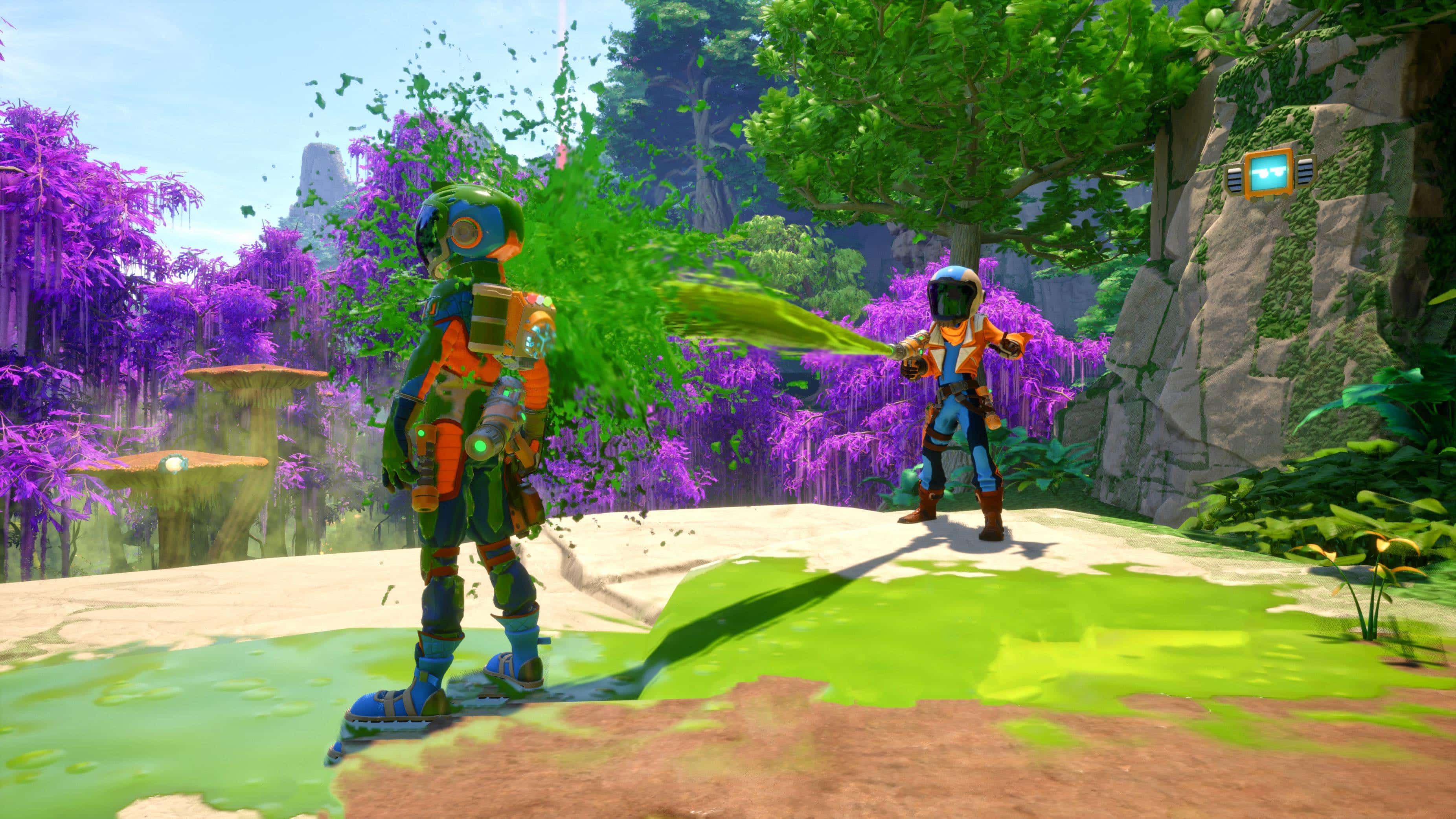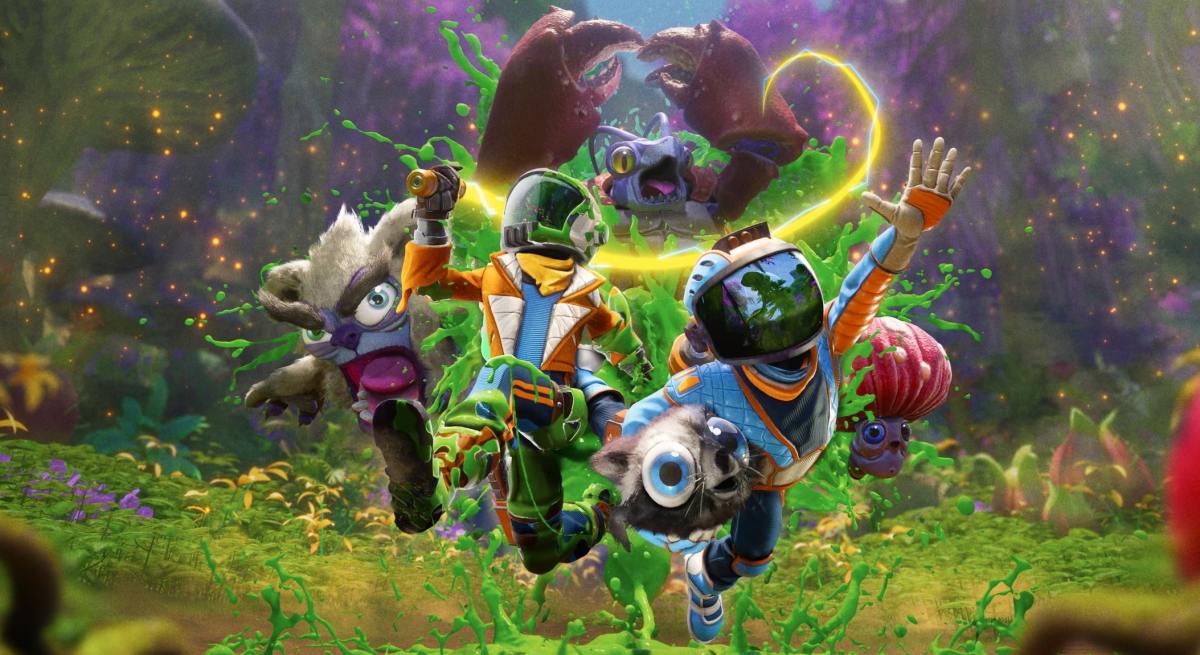Revenge of the Savage Planet feels like a miracle. This sequel to Journey to the Savage Planet was one born of hardship, with a long path to development complicated by a falling domino of changes in the games industry. To set the stage, Journey was developed by Typhoon Studios, a Canada-based developer founded in 2017, and later acquired by Google for its Stadia Games and Entertainment arm.
Even the mention of Google Stadia is enough to send shivers down the arm, so you might guess what happened next. Following the release of Journey to the Savage Planet on this ill-received streaming platform in 2021, Typhoon was unceremoniously shuttered, alongside the rest of Stadia Games and Entertainment.
Unwilling to let the studio and its talented cohort of developers disappear, former staffers including Alex Hutchinson, Reid Schneider, Yannick Simard, Erick Bilodeau, and Marc-Antoine Lussier gelled back together to form Raccoon Logic. Not only that, the team was able to negotiate to obtain the rights to Journey to the Savage Planet with the aid of Tencent – a rare feat for a modern games studio.
So often, IP is treated with disregard. It’s kept as a prize by upper management, even without intention to use it well. But the newly-formed Raccoon Logic knew it had something with Journey, and so it pursued work on Revenge of the Savage Planet with a stubbornness that drove the process forward.
Sticking it to the man
“It always appears to be a minor miracle that any game ever gets finished and release,” Alex Hutchinson, creative director and co-founder of Raccoon Logic told GamesHub. “When you’ve got something that actually works, it’s incredibly frustrating not to be able to profit from that hard work, and the experience, and the base you built.”
Hutchinson and the entire Raccoon Logic team felt they still had “a lot left to prove,” so they pushed to get the rights to Journey back, and to continue forging the studio’s path without a big corporation “squashing” them. While Hutchinson acknowledged the ringer Typhoon was sent through was all above board, he expressed frustration at the process, and how the studio’s story was cut off too soon.

Rather than focussing on this hurdle, the team decided collectively to forge ahead, and even to weave the story of Journey‘s sequel around their own experiences, and the struggles faced with wresting your IP from a major conglomerate.
Read: South of Midnight interview – Crafting a menagerie of “monsters”
“In any form of traditional art, your real world experience often informs the work you do,” Hutchinson said. “I thought, why don’t we take that, because we already had a story about evil corporations, and tell our own story, in a very metaphorical sense.”
As Hutchinson described, Raccoon Logic formed as a free-thinking studio, made stronger by its experiences under the Google banner. With no major corporation controlling the development of Revenge of the Savage Planet, the team was able to wield lessons learned on Journey, and take a “nothing to lose” approach to making it wilder and more spirited than before.
“There was no point in doing it half-heartedly,” Hutchinson said. “So we went all in.”
Lessons learned from the past
For Hutchinson, that sense of going all-in, as well as learning to pivot and persevere was actually born in a familiar place: the Australian games development industry. For those unfamiliar, Australia’s games scene is typified by periods of ups and downs. We’ve seen major companies established in the region, thanks to tax cuts and other incentives, and then unceremoniously shut down when these opportunities dry up. Per Hutchinson, even during his tenure in the late 1990s to early 2000s, the scene was incredibly rocky.
He began his career in games by writing about them, sending away articles to be published in a variety of British magazines. Later, he was able to secure work with Torus Games in Melbourne, producing an array of Game Boy titles. In a short period, he shipped five games – which proved to be invaluable experience in the next stages of his career. But then came a downturn in Australia’s games industry.

“Things were looking pretty bleak,” Hutchinson said. “Lots of studios weren’t getting work, and it seemed like it was just going to be work for hire. All the exciting stuff was happening overseas.”
In the early 2000s, in search of new opportunities, he ventured to the United States, and secured work with Maxis, as one of the lead designers of The Sims 2, as well as Spore. Later, he also worked at Ubisoft Montreal, serving as the creative director of Assassin’s Creed 3 and Far Cry 4.
Throughout these experiences, and into work with Typhoon and Raccoon Logic, Hutchinson carried with him the lessons learned forging through darker times in Australia’s games industry, and knowing the waves that come with developing games.
“I think you don’t learn anything from success,” Hutchinson said. “You learn things from failure, and if you’ve been around long enough, you realise it’s cyclical … it’s sort of a boom and bust business. It’s a hit-based business.”
Having this knowledge helped to guide the formation of Typhoon, and then Raccoon Logic. The team will remain small moving forward, and with the lessons of the past clear in their minds. The vast majority of the team has experience working at larger studios, and they’ve all been through the eddies of the games industry.
With that unique perspective, the team has worked to create a game inspired by their own thoughts and feelings, and their own personal experiences. It’s why humour and darkness go hand-in-hand throughout Revenge of the Savage Planet, with comedy being a major focus.
Humour in dark times
One of the core tenets of Revenge of the Savage Planet during development was to maintain the humour and satire of the original game – but with a more pointed focus. As Hutchinson proudly described, there is an element of pettiness in some of the jokes included in the game – Hutchinson specifically noted being inspired by the “Nicepool” drama surrounding Deadpool & Wolverine – but as with all comedy, the team aims to fire their jokes at the right targets.
“I’m equally as petty as Ryan Reynolds,” Hutchinson said. “That’s what I learned … You can be as petty as you are funny … as long as they deserve it.”
As Hutchinson described, it’s also about balancing fun humour, while avoiding being mean. Satire is designed to lampoon certain topics, but if it’s nasty or ill-humoured, it can off-side audiences, and a bitterness lingers. Implementing impactful humour is a layered art.
To nail the tone, the team studied classic film and TV comedy. Hutchinson was guided by a theory that too often, developers attempt to put traditional film and TV comedy elements into games. They try to put the humour in dialogue and story. But with their interactive elements, games are a more complex medium – and so, the humour must also be complex, and meet the audience in its own way.

“It seemed to me, if we could figure out how to put the humour in the action, then we’d actually solve that problem,” Hutchinson said. “So that’s what we tried to do, underneath the satire.”
Hutchinson described a moment working on Far Cry 4 in co-op that helped to underline his understanding of humour in games. In one particular battle, he threw an explosive to kill an enemy, but a bear caught on fire. Then the bear, now temporarily buffed by fire, managed to kill his co-op companion. It was an exercise in physical slapstick within the game.
“It was the funniest thing that had happened in months, and I thought, ‘That’s it. That’s the secret sauce.’ … That’s the kind of comedy that can’t exist in movies and TV, so that’s what we’re pursuing, in terms of writing.”
This comedy edict was paired with a long-time love for co-op gameplay, to create a dynamic and tongue-in-cheek world better explored with friends. Hutchinson cited experiences playing in arcades and on the Amiga 500 as being formative for this direction, as well as the coronavirus pandemic years – being able to play games as a social activity.
Together, the full scope of these experiences have shaped work on Revenge of the Savage Planet. It’s a game born of resilience and some measure of bitterness – but one that aims to rise above, with good humour and a memorable co-op experience.
With the story of Journey originally set to end in heartbreak, it’s fantastic to see the Typhoon kicking on, and to see developers reclaiming their IP with a renewed sense of dedication.
On its surface, Revenge of the Savage Planet might be a game about exploring colourful planets and meeting more alien Floopsnoots and Barfers (whether alone or with friends), but the deeper story behind it is just as fascinating as the game itself.
Revenge of the Savage Planet is set to launch for PlayStation, Xbox, and PC on 8 May 2025.





